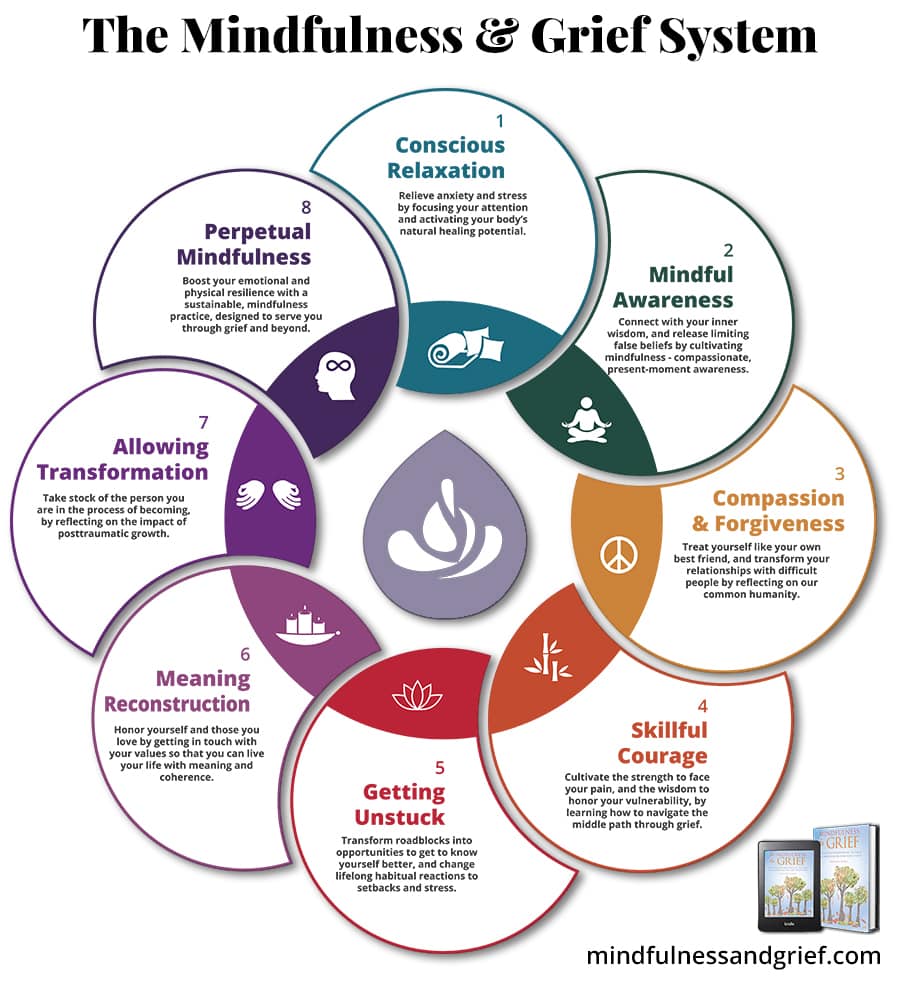Meditation for grief does not change what has happened, but it can help you care for yourself with the compassion you deserve. It can also help you with a variety of symptoms associated with the grieving process, and help you feel more in control. No matter where you are on your grief journey, meditation is a healing practice that can help you:
- Get back to sleep and counteract grief-related insomnia.
- Reduce physical pain and tension.
- Ease difficult emotions.
- Cultivate compassion for yourself and others.
- Establish and maintain a connection with your loved one.
- Improve your immune functioning and overall health.
- Increase your ability to focus and concentrate.
Finding Hope in Grief
If you are early on in your grief, I know items on this list above may seem unattainable. The sorrow and emotional pain of grief is overwhelming, but I am here to offer you hope. Humans are wired to survive loss, but having coping and self-care tools can really help you navigate life after loss and revive your spirit.
I teach grief meditation techniques to individuals and groups, and have been doing so for over two decades. During that time I have seen bereaved people just like you cope with the pain of grief and eventually start living again. In the early days, it helps you suffer less. As you work through your grief, it helps you rediscover meaning.
I have had to use it myself, after my stepfather died suddenly after surgery. Even though I was already leading Mindfulness & Grief groups, I was in deep pain, lost, and heartbroken over his death. So please keep reading, and give the guided meditations for grief that I offer below a try. I know they can help.
What Is Meditation?
The concept of meditation is similar to the concept of exercise: There are countless ways to do both. Exercise can be a gentle walk or rock climbing, Zumba, or swimming, and there are countless ways to meditate, too. You can simply take a deep breath and focus on the present moment, cultivate a sense of gratitude in your body, or focus on a word that gives you a break from thinking.
Physical exercise strengthens your body. Meditation - mental exercise - strengthens your brain. Personally, I define meditation as compassionate mind-control.
When you meditate you choose where to direct your attention, rather than let your imagination run all over the place. This is why meditation is a lot like exercise! It requires training and practice. And even the best athletes don't stop working out. In fact, many have personal trainers.
So if you are new to meditation, I want to encourage you not to get discouraged. It is not uncommon for new meditators to think they are not "good" at meditating, or tell me they have tried it before and feel they are doing it all wrong.
I believe that there is no such thing as a good or bad meditator. There are people who meditate. There are people who do not. The act of attempting to control your mind leads to amazing results. Even if you are distracted most of the time!
If you are ready to experience the benefits of a meditation practice, start with guided meditation, where a teacher leads you through the practice. If you are feeling restless, you may also find it helpful to try some meditation in motion, such as yoga or thai chi.
Self-Compassion for Your Grieving Mind
If you are grieving and trying to meditate, the first thing you need to do is give yourself a break. Let go of perfection. Let your practice be messy - like grief.
The relationship you have with the person who died is now part of your life, and that cannot, and should not, be changed. In fact, it is helpful for most people to honor the relationship and incorporate the love and the memories into life after loss. If the relationship was not an easy one, it is important to acknowledge that painful emotion, and work towards showing yourself mercy for any guilt, anger, or regret that you feel.
On our best days our mind naturally spends a lot of time traveling back and forth through time. Rehashing the past. Rehearsing the future. And rarely does it do this in a way that reduces our suffering. Instead it causes a lot of stress and anxiety.
Even in the midst of the sadness of grief, you can learn to control your mind at least some of the time, and in the process reduce emotional and physical pain. So go easy on yourself. Know that trying is really enough. ALWAYS practice self-compassion as self-care.
Free Meditations from Mindfulness & Grief
So what type of meditation is best for you? That depends on what you need in the moment. All of the foundational practices listed below help you build the resilience you need to live with your loss and re-engage with life in a meaningful way.
The guided meditation MP3s below are based on the Mindfulness & Grief book, and are examples of resources that are available when you join the Awaken Meditation for Grief Group , which has a course library filled with guided meditations and videos. We also meet online every week to practice, share, and support one another.
Focus & Concentration Meditation
In the early days of loss, focus and concentration meditation, such as counting your breath or mantra meditation, can help give your mind a much-needed break from thinking and calm down your anxious mind. This can also help reduce physical tension, and even change how you relate to physical pain. When you are able to take care of your body, your mind will feel some relief, too. After all, the physical pain of grief just adds suffering to suffering.
Practicing meditation after a major loss can help you cope with the physical and emotional symptoms of grief. While grief and depression are not the same thing, they can feel very much alike. When you practice meditation during grief - specifically, focusing practices such as counting and breath meditation - you signal to your brain that it is safe to turn off the fight-flight-freeze response, which can help reduce anxiety. You also give your attention a place to rest, which will lessen rumination and worry.
New students often tell me that their body feels better after learning meditation for grief, even than it did even before the loss. Relaxation meditations are particularly good at healing physical discomfort - especially in the early season of grief. Coupled with focusing meditations, I find these to be particularly helpful with grief-related sleep problems .
Focusing Meditation
Using a Personal Mantra
10 Minutes
Mindfulness Meditation
This mindfulness practice will help you cultivate a calm and meditative mind. Rather than time travelling to the past, future, or fantasy, you learn to rest your attention in bodily sensation, as well as other sensory experiences that are actually happening. The peace that arises when you relinquish worry and rumination is one reason why mindfulness is so popular.
Mindfulness doesn't mean you pretend everything is OK. It does mean that you make space for everything you are experiencing - pleasurable, unpleasurable, and neutral. This is an antidote to the natural negativity bias and help us appreciate what we have as we also honor what we have lost.
You can strengthen your mindfulness practice using the meditation below, but be sure to weave mindful moments in sporadically throughout your day.
Daily Guided Meditation
With Focus, Mindfulness & Compassion
20 Minutes

Meditation For Grief Online Group & Course Library:
Get The Mindfulness Training You Need & The Support You Deserve.
Compassion & Loving Kindness Meditation
This meditation will help you soften your heart to your own struggles, and feel more connected to your loved ones by acknowledging our shared humanity and the universal desire to be happy, healthy, and safe.
Grief can be very lonely. Compassion meditation for grief helps you connect more deeply to yourself and others, and it can help you feel less alone, even when you physically are alone. In addition to being hard on ourselves during grief, we may tend to be hard on others, and vice versa!
When someone dies, everyone around them is left feeling raw and vulnerable, and this can lead to conflict. Additionally, everyone grieves differently. People may be telling you that you aren't "grieving right," or you may feel that way about someone else. These heart practices help us see clearly that all of us want to be free from suffering, and we are doing the best we can.
Metta Meditation for
Compassion & Lovingkindness
15 Minutes
Meditation for Difficult Emotions
After you finish reading this article, I highly recommend this one devoted entirely to meditation for grief and sadness . In short, it acknowledges that when we resist a difficult emotion, it persists. Tending to your grieving heart with compassion is one of the most healing practices you can do when you are grieving.
Meditation for Grief & Sadness
20 Minutes
Contemplative Meditation
As you begin to re-engage in your life after loss, adopting more contemplative practices will help you acknowledge the ways that you have changed and rewrite your post-loss story.
At some point you will start to rebuild your worldview. Contemplative practices can help reorient you to your changed landscape. Who are you now? By turning toward your pain rather than avoiding it, you can see more clearly your own wisdom and truth. To me, this is the crown jewel of meditation for grief, and it can have a lifelong impact on how we relate to our own precious life.
This type of meditation invites us to ask a question in a contemplative manner, and find the stillness to receive our own guidance. This empowers us to chart our own course through grief - rather than trying to fit into a contrived method or process.
Mindful Self-Inquiry Meditation & Writing Practice
20 Minutes
I Am Here To Help: My Book, Private Sessions, & Group
If you want to learn more about meditation for grief, please read my Mindfulness & Grief book. Or if you want more personal support, book a 1-on-1 meditation for grief session or join me in the Awaken Meditation for Grief Spport Group .
My Mindfulness & Grief System is based on contemporary grief research and uses time-tested meditation techniques to help you move forward in a way that builds meaning and resilience. I hope you find these teachings helpful, and will share them with anyone who can benefit.


